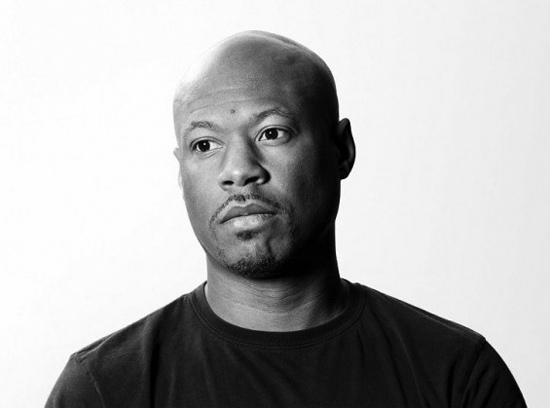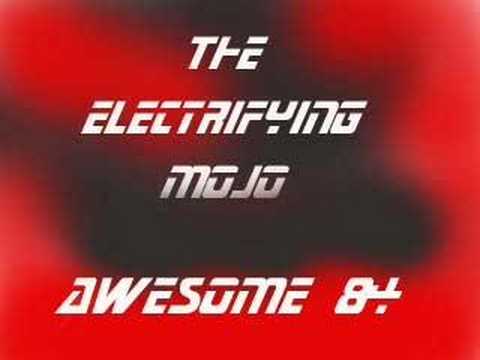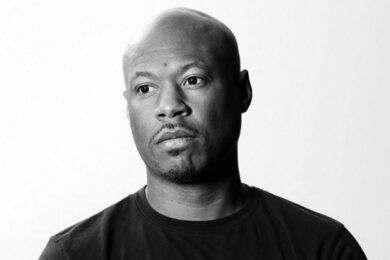Robert Hood is one of the single most unifying figures in world techno. His stripped-to-the-bare-bones, almost illicitly funky tracks are imbued with propulsive force and seductive grace in equal measure, and his devotion to teasing maximal impact from stark elements has long seen him recognised as the king of stack-shacking reductionism.
As likely to be played by Surgeon in an East London basement as Sven Väth in an Ibiza main arena, even in the disorientating cut and thrust of a peak time set Hood’s tracks are instantly recognisable. Given that they’re often comprised primarily of skeletal fundamentals that change nigh on imperceptibly, this is remarkable. However, that he has spent the past two decades addressing minimalism, both conceptually and as a musical construct, it is also understandable.
Starting his musical career as ‘Minister for Information’ in Detroit under the austere tutelage of the early ’90s Underground Resistance, alongside Jeff Mills and ‘Mad’ Mike Banks, Hood quickly struck out alone and began making music that was markedly different both to the hardcore acidic attack of UR, and also the more melodically progressive techno being made in Detroit at the time.
His 1994 debut album Minimal Nation set out a manifesto in the starkest of terms. This was music to move to, total body music that distilled techno down to sheer dominant funk, devoid of any shred of fat. However, while his music has often been stark, it has never been derivative: Hood put serious thought into reasoning and methodology. Minimal Nation, culturally speaking, was more than the ten perfectly rendered dancefloor bombs it contained – it was a proclamation for minimalism as a musical construct within techno, and it remains the blueprint to this day. In the 1994 sleevenotes, Hood wrote the following passage by way of explanation:
"Vision is foresight with insight based on hindsight. The first key to understanding minimalism is to realise that it emanates from art. Art emanates from vision, vision from purpose and purpose from the creator, God…. Minimal Nation is not just a collection of rhythm tracks, but a supernatural work of art realised. I felt a strong sense of urgency to create a body of work that identified with what was placed on my heart, as opposed to what was on my mind. Regardless of its diminutive nature, one should never underestimate the neural potency of minimalism."
Indeed, spiritual awareness – specifically his strong Christian beliefs – is a vital thread of Robert Hood’s techno music. Given the overtly hedonistic nature of the spaces in which he works, it’s a fascinating dynamic, and one that poses the question: does knowing the spiritual intention of a track’s creator change the way in which you hear the music? In Hood’s case, the knowledge that his music is coming from a place at polar odds with the popular conception of electronic music as aural conduit for self-indulgence sets up a unique and interesting duality (of which more later).
But make no mistake: he delivers banging, pure ‘floor music like few others. Hood’s DJ sets are joyous occasions – often played at frenetic speed and making extensive use of his own productions, he displays a deft understanding of total body command. Indeed, it is this aptitude for complete dancefloor control that underpins his new album Paradise, the first full-length released under his aptly named Floorplan alter ego. Linking the ecstatic exaltations of gospel, funk and disco to techno and house, Paradise is a singular expression of spirited joy, almost maniacal in its vehemence and forward motion.
However, Hood also regularly works within darker pastures. 2010’s Omega was a tough concept album based on the apocalyptic 1971 movie The Omega Man, while last year’s Motor: Nighttime World 3 addressed the social, financial and physical disintegration of Detroit while also representing a stylistic change for Hood, featuring the most fulsome and progressive arrangements of his career. Ahead of a busy summer of Floorplan gigs, Hood spoke to the Quietus from his home in Alabama, to talk radio, spreading love and midnight vision.
The Floorplan project has been going for a decade or so with various 12”s released and regular shows. What made you decide you wanted to do an album under that name?
Robert Hood: Well, I had a vision in the middle of the night. I was lying in bed and I was awakened by a premonition about using gospel – using gospel music – in stripped-down techno. Infusing the essence of holy music with disco, coupled with techno. I think the track ‘We Magnify His Name’ was the first track to come from that with regards to the LP, also ‘Never Grow Old’. It gradually evolved to a full-length record – I really wanted to get all the influences down, gospel, house, disco, and techno, all of the emotions that speak of the club side of Robert Hood. Gospel music itself had never really been used with techno before but gospel, and disco, has been a big part of my musical life. The house element is important in Floorplan too. This is real party music – anything goes.
When were you first exposed to disco?
RH: In the late ’70s in Detroit disco was real big – there was a record by the Clark Sisters, ‘You Brought The Sunshine’, and that was a real big club record in Detroit at the time, so I guess disco has always been right at the core of my sound. It’s all drawn from the rhythm track, you see?
Bass, drums. I was going right back to when I was a kid, people like Peter Brown. It was always the breakdown that had people, the breakdown was where it was at. People gravitated toward it, and just went crazy for that break. So, really, at the essence, my sound was based around that – just trying to capture the essence of disco, the break, the rhythm. Radio played a huge part in that when I was a kid – I played real close attention to how it was orchestrated. Every week I listened to The Electrifying Mojo on WGPR.
That show has been mentioned by a number of Detroit artists – did it play a vital role in your musical development?
RH: Oh, absolutely. Completely. It was vital. I’d listen every week, every single week, and it didn’t matter what he was playing – he might be playing an MFSB track, he might be playing an Elton John track, he might be playing Kraftwerk or James Brown. But it wasn’t just about what he was playing – it was equally about the way that he was presenting the show. He had a message of hope for the people of Detroit. The Electrifying Mojo was a spiritual tutoring; the message, the narration. He wouldn’t just play records – he’d build up a spirit of hope in people when it was badly needed. You know, he’d say things like ‘When you’re at the end of the rope, don’t tie the knot…keep on hanging’.
The Electrifying Mojo – Awesome 84′
How did you decide that electronic music was to be your chosen medium of expression?
RH: Well, I always wanted to do something original. I had no interest in following in the footsteps of people like Juan Atkins, Derrick May or Todd Terry – they were already doing their thing. I always felt a real sense of urgency to follow my own path, and not just go down the path that had already been trodden. You know, not just repeat what Transmat was doing. My idea was to just focus on what was essential, and be quite ruthless in stripping anything else out. In terms of pure electronic production, the pivotal moment was Derrick May’s radio show in ’85/’86. Listening to what Derrick was playing was just a huge inspiration – it was weird, it was out there, it was abstract, it was arty. He’d play weird acid, house, disco, all kinds of crazy sounds.
And how did this progress into production?
RH: I started out with a Roland TR-505 that I picked up from a paw nshop. At first I was going to a studio where I paid £15 an hour to record demos, and it was about learning how this thing actually, truly worked. Soon after that I got involved with Mike Banks and Jeff Mills, and I can always remember them saying to me that if I wanted to be an artist I’d need to strike out – like, ‘If you want to do this you’re going to have to take control of your own destiny, build a studio’.
I’d love to hear a little about the early Underground Resistance days…
RH: Well, being a black man growing up in Detroit… What you need to understand is that we were the children of the riots, you know? We saw the murder of Dr. Martin Luther King, the murder of Malcolm X.
All three of us were on the same page… we were feeling this at the same time. We were hugely aware of social injustice. Underground Resistance had a stance of standing in the face of injustice. I hate injustice. Mike had his perspective on politics, we were all driven by the same sense of urgency, had the same call. We were all being put in a box by the establishment, and UR was a way of breaking free from that box. Detroit was going through so many problems, and it all happened so incredibly fast – it was like the city was disintegrating in front of our eyes.
It’s a subject you touched on extensively last year with Motor: Nighttime World 3. You now live in Alabama – what was the inspiration for the record?
RH: I really went back over the music – I listened to a lot of Detroit records during the recording process, Carl Craig, Kevin Saunderson. Moving from Detroit to Alabama I was thinking about it from the outside in, rather than from the inside out. I mean, I was looking back on my upbringing when pretty much everyone had a job, everyone had a two garage house, but even back then I sensed complacency. Then the lay-offs began to happen at the factories. It really did become a slow motion disaster, crack cocaine decimated whole communities.
How quickly did it come in?
RH: It seemed like an almost overnight thing, with crack. I mean, when I was a child I didn’t have to worry about getting shot or stabbed when walking to school. It went from being an extremely resilient city with a sense of hope and a sense of progression to a place of no hope. You know, it’s like the Bible says, ‘Where there are no dreams, the people shall perish’. Now it’s just turned into pure survival, Detroit in survival mode – on the record, I wanted to catch that atmosphere of people coming from the south to make it in Detroit and then the flipside, the reverse migration.
The layoffs, the drugs, the gangs – it seemed like there was this three or four year period of the stark reality of darkness and despair. Whole families were being massacred in their own homes. People had fallen into a false sense of security – we’d fallen into being totally reliant on the motor industry, the automotive industry had replaced any kind of faith. Ford… well, when it goes down, if that’s all you got, you go down.
I’m interested in faith, and how it relates to your music. The techno world can be overtly hedonistic…how do you deal with that?
RH: Somebody asked me a few years ago, how do you balance being a minister – because I’m a minister too, you know – with being a DJ, and a techno DJ at that! [laughs]
The way I see it is this: God has given me a platform, and with this platform I can speak life instead of speaking despair and darkness. So, when I go to play at the Berghain in Berlin, or – what’s that club I always play when I’m in London, I forget the name for a second, my memory… [laughs]
Fabric?
RH: Yes, Fabric! When I go and play somewhere like that, I’m not coming at it from a position of damnation or judgment or anything like that, you know? I’m not there to cast judgment on what people do, it’s simpler than that. I’m a vessel, and I’m delivering God’s message through techno.
Am I right in thinking that in the early days in Detroit, techno was seen in a rather different light to today – less focused on the party?
RH: People need to understand that when we first started out at the Music Institute in Detroit there were no drugs, there was no alcohol. We were there for the music, and the music was all that was needed. Certain individuals may have turned it into a Sodom and Gomorrah situation, but that certainly wasn’t how it was.
It’s just like the hip hop scene; you don’t get so much real hip hop anymore. Where is the message now? Growing up in ’70s Detroit we had people like Marvin Gaye, Stevie Wonder, Curtis Mayfield, and they had a message of change, a message of tangible hope. Now it’s about Chris Brown and how many one night stands he might have had, you know? The whole hip hop culture is about living in excess, and that carries over into techno and electronic music too. I’ll play at these festivals and people are just running amok, man – after parties, all kinds of madness.
But that said, my message is not one of judgment, and it’s not one of condemnation, I want to be very clear on that. It’s simply, ‘Let me wake you up!’ Love is the message.
You address serious concepts in techno – Omega, for example. How does this work on a musical level, without any lyrical input – how do you get the message across that ‘this isn’t just a techno track, this is a techno track about X’?
RH: Wow – that’s a really good question. And it’s a difficult one to answer because, you know what, it’s right, in that if you remove the lyrical content of music you have to have a different method in order to set down your vision, you have to be even more in control. When I approach something like the Omega project, what I need to do is to make sure that the method is correct. The idea is contained within my head, and I need to be totally in control of my machines in order to get that message out.
Music is painting a picture, and you have all of the tools at your disposal. It’s like making a sound moan, or making a sound cry. It comes down to proper mindfulness, not being separated from the machines – breaking down the barrier between man and machine. I let my emotions out through the wires, whether it’s the hats that are speaking the message or whether it’s the drum pattern. I become one with the instrument – my emotion is controlling it, rather than the other way around.
I’d love to gauge your feeling on the whole ’00s ‘minimal’ movement. It seemed to me that much of it was progressive, rather than really minimal. What was it like from your point of view, after building a career from true minimalism?
RH: Music needs to tell a story, it has to be saying something. In music you need to have some kind of emotion, and that whole thing was just lacking any kind of emotion. It’s kind of like that movie The Fifth Element – it might look slick, but you come out of it thinking ‘What was that movie actually about?’
You need to have a focus. Take anger as an example. Public Enemy knew what to do with anger – the anger in a Public Enemy record is a controlled chaos. Or with funk, KC and The Sunshine Band was a controlled funk, it’s not just about being funky for the sake of it – they could turn that on when needed, you know?
And which artists are you enjoying right now?
RH: I always enjoy Mark Broom, he does some great music, I love Ben Sims. I’d mention RZA, for his trajectory – he’s gone from being a hip hop producer to somebody who scores movies, which is pretty incredible.
And how about the current resurgence of techno?
RH: It’s back with a vengeance. I would say it’s stronger than ever now but it comes with a great responsibility. In the US right now, electronic music is a category in the Grammys, but what are we going to show the mainstream? Are we going to show them drugged out raves, or are we going to show them a real art form? It’s important at this juncture that we steer it in the right direction, the direction of true art.
Floorplan’s Paradise is out now via M-Plant




